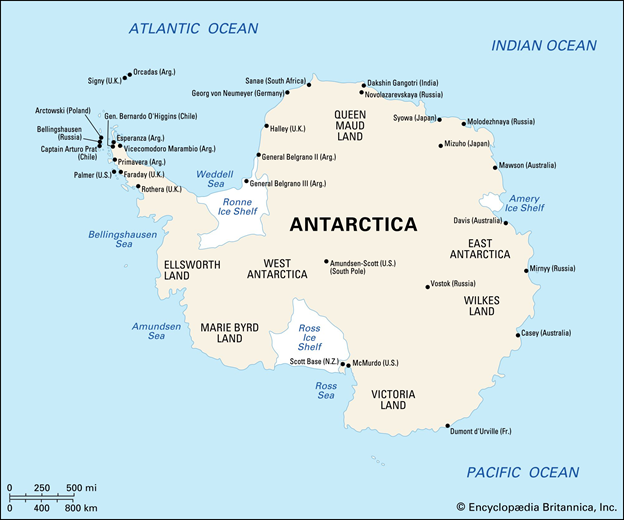Recalling India’s Antarctica activities
Context
The Indian Antarctic Bill, 2022, passed in Parliament, seeks to protect the Antarctic environment and regulate activities in the region.
- The government is aiming to have India’s own national measures for protecting the Antarctic environment and associated ecosystem.
About
The region
- It is a cold terrain, located in a remote area in the Southern Hemisphere covered by the Antarctic Convergence– an “uneven line of latitude where cold, northward-flowing Antarctic waters meet the warmer waters of the world’s oceans.”
- Antarctica is an exclusive landmass without a native population, though there are human settlements with scientists and their support staff working round the year.
- The continent of Antarctica, including its ice-shelves, and all areas of the continental shelf adjacent to it along with all islands (including their ice-shelves), seas, and air space south of 60°S latitude, are part of the legislation's jurisdiction.

What is the Indian Antarctic Bill 2022?
- The Bill seeks to give effect to the Antarctic Treaty, the Convention on the Conservation of Antarctic Marine Living Resources, and the Protocol on Environmental Protection to the Antarctic Treaty.
- It also seeks to protect the Antarctic environment and regulate activities in the region.
|
India signed the Protocol on Environmental Protection to the Antarctic Treaty on 14th January, 1998. |
|
About Antarctic Treaty:
Antarctic Treaty System (ATS) includes the three international agreements are:
|
Key features of the Indian Antarctic Bill:
- Applicability:
- The provisions of the Bill will apply to any person, vessel or aircraft that is a part of an Indian expedition to Antarctica under a permit issued under the Bill.
- Areas comprising Antarctica include all islands (including their ice-shelves), seas, and air space.
- Central Committee:
- The central government will establish a Committee on Antarctic Governance and Environmental Protection.
- The Committee will be chaired by the Secretary of the Ministry of Earth Sciences.
- There are the nominated members - 10 members (to be nominated from various ministries) + two experts (on the Antarctic) + chairman (Secretary of the Ministry of Earth Science).
- The functions of the Committee include:
- Granting permits for various activities.
- Implementing and ensuring compliance of relevant international laws for protection of Antarctic environment.
- Obtaining and reviewing relevant information provided by parties to the Treaty, Convention, and Protocol.
- Negotiating fees/charges with other parties for activities in Antarctica.
- Need for permit: A permit by the Committee or written authorization from another party to the Protocol (other than India) will be required for various activities such as:
- An Indian expedition to enter or remain in Antarctica.
- A person to enter or remain in an Indian station in Antarctica.
- A vessel or aircraft registered in India to enter or remain in Antarctica.
- A person or vessel to drill, dredge or excavate for mineral resources, or collect samples of mineral resources.
- Activities that may harm native species.
- Waste disposal by a person, vessel, or aircraft in Antarctica.
|
About Indian Antarctic Authority (IAA):
|
What are the prohibited activities under Indian Antarctic Bill?
- Nuclear explosion or disposal of radioactive wastes.
- Introduction of non-sterile soil.
- Discharge of garbage, plastic, or other substance into the sea which is harmful to the marine environment.
What are the offenses and penalties under Indian Antarctic Bill?
- Nuclear Explosion - Conducting a nuclear explosion in Antarctica will be punishable with an imprisonment of 20 years which may extend to life imprisonment and a fine of at least Rs 50 crore.
- Drilling for Mineral resources/ Introducing non-native Animals/ Plants in Antarctica without a permit - will be punishable with imprisonment of up to seven years and a fine between Rs 10 lakh and Rs 50 lakh.
- The central government may notify one or more Sessions Courts to be the Designated Court under the Bill and specify its territorial jurisdiction to try offenses punishable under the Bill.
How is Antarctica governed?
- The continent is a no-man’s land — a natural reserve that belongs to no country.
- It is only governed by global agreements — Antarctic Treaty and the Protocol on Environment Protection to the Antarctic Treaty or ‘Madrid Protocol’, and the 1980 Convention on the Conservation of Antarctic Marine Living Resources.
- India is a signatory to all three treaties and the proposed bill is in adherence to them.
- The 1959 Antarctic Treaty now has close to 54 countries on board, of which 29 countries — including India — have the status of Consultative Party with a right to vote in the Antarctic Consultative meetings.
Can India make a law in no-man’s land?
- While no single country can stake any claim on any part of Antarctica, they have liberty to govern the areas where they have set up their research stations.
- Over the years, several countries have laid down their laws to enforce the existing global treaties more effectively and keep a check on any violations.
- India, so far neither had any law, nor any teeth to take action if a violation takes place.
- The enforcement of such laws will confer jurisdiction on the courts of India to deal with any dispute or crimes committed in parts of Antarctica.
- Legislation of such a kind will bind the citizens to the policies of the Antarctic treaty system.
|
India’s presence in Antarctica
|
Why the Antarctic matters today?
- Huge landmass: The continent of Antarctica, the fifth-largest in terms of total area, covers a significant part of the Antarctic region.
- World’s natural laboratory: Called one of the world’s most significant ‘natural laboratories,’ Antarctica witnesses as many as 30,000 tourists each year to experience Earth’s most exquisite features.
- Vital for science: It is even more vital for science insofar as its great impact on the world’s climate and ocean systems is a matter of intense research investigation.
- Rich nature: Though Antarctica is fragile and even more vulnerable, it is believed to hold rich deposits of oil and vital minerals. That is what attracts the world’s major powers.
- A competive location: Antarctica’s competition is rising day by day with major economies showing direct interest.
- China has already marked its presence as “a polar power with stated goals of greater leadership in international polar organisations and securing future resources to sustain economic growth, energy and food security.”
- The US is also citing China and Russia as a reason to step up its own Antarctic deployment.
Conclusion:
India has conducted a wide range of research on topics including the climate process and its connection with climate change, environmental processes and conservation, terrestrial ecosystem, observational research, and polar technology in the Antarctic. It will protect and maintain the ecological balance in the Antarctic region.





